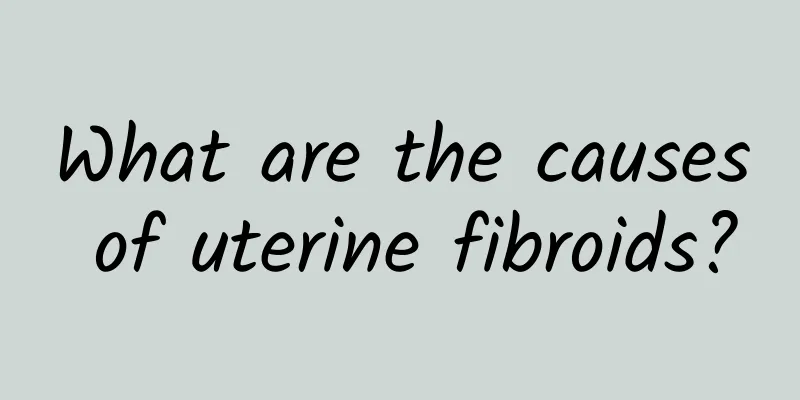What causes uterine fibroids? What are the symptoms of uterine fibroids?

|
Uterine fibroids are common benign tumors of the female reproductive system, and there are many reasons for their occurrence. Patients with uterine fibroids often experience a series of symptoms, such as irregular menstruation, abnormal flow, abdominal pain, etc. Below we will learn in detail about the causes and related symptoms of uterine fibroids. What causes uterine fibroids? The cause of uterine fibroids is still unclear, but there are some factors that are believed to be related to their occurrence, such as abnormal changes in hormones, genetic factors, and insufficient blood supply. Abnormal changes in hormones are considered to be one of the main factors, especially increased estrogen levels may cause the growth of fibroids. Genetic factors are also considered to be a risk factor. If someone in your family has uterine fibroids, then your risk of the disease will increase. Insufficient blood supply may also lead to the occurrence of uterine fibroids. So, what are the symptoms of uterine fibroids? The symptoms of uterine fibroids vary depending on their size, number, location and other factors. Some patients may not have obvious symptoms, and the fibroids are discovered during routine gynecological examinations. However, most patients will experience some obvious symptoms, such as changes in the menstrual cycle, heavy or irregular menstruation, prolonged menstruation, and even intermittent heavy bleeding. Abdominal pain is also a common symptom, and the pain may be continuous or intermittent. If the fibroids are large, they may put pressure on the bladder and rectum, leading to frequent urination, constipation and other conditions. Finally, a little bit of science about "What causes uterine fibroids": Although we know some factors that may cause uterine fibroids, there is currently no clear way to prevent them. However, for patients who have been diagnosed with uterine fibroids, there are some measures we can take to relieve symptoms and control their growth. Regular gynecological examinations are very important and can help detect uterine fibroids early and treat them in time. Maintaining a healthy lifestyle, including a balanced diet, adequate exercise, and emotional control, can also help reduce the occurrence of symptoms. In terms of treatment, the doctor may recommend medication or surgery, and the specific treatment plan will depend on the size of the fibroids and the severity of the symptoms. Early uterine fibroids are usually benign, and most patients can achieve good treatment results. Uterine fibroids are a common gynecological disease with a variety of causes. Although we cannot completely prevent their occurrence, we can reduce the risk of disease through regular checkups and maintaining a healthy lifestyle. If related symptoms occur, be sure to seek medical attention in time and seek professional medical advice and treatment. |
>>: What is the relationship between uterine fibroids and hormones?
Recommend
Will you get fat just by breathing? Lethargy, edema, fatigue? Be careful, it's hypothyroidism that's causing the problem
"Doctor! It seems like I gain weight even ju...
How to treat right appendage inflammation
Right adnexitis usually requires medication and l...
Common causes of adnexitis
Although many people have learned about adnexitis...
What medicine is good for endometritis and pelvic inflammatory disease
Antibiotics such as metronidazole, levofloxacin a...
Enjoy a slim and good life! Start by implementing the three tips of rejecting sugar, picky eating, and hyperactivity.
Obesity has a great impact on health. Among the t...
What are the early symptoms of miscarriage? There are these 3 major symptoms
You should pay attention to all aspects of your b...
What are the dangers of cervical hypertrophy?
What are the dangers of cervical hypertrophy? Wha...
What are the symptoms of spontaneous abortion? Knowing them early will benefit you sooner
Spontaneous abortion brings indelible damage to w...
Can cervicitis heal itself?
Cervicitis is a disease that needs treatment and ...
Experts explain the causes of vulvar leukoplakia
Vulvar leukoplakia is a female gynecological dise...
Ovarian cyst surgery should be selected according to the actual situation
Ovarian cyst surgery is a treatment method that i...
4 tips to help you go to work in high spirits after a workout
Going to the gym in the morning to exercise befor...
Causes of bleeding in urine after menopause
Urine bleeding after menopause may be related to ...
Are you still eating lots of fish and meat for the New Year dinner? Nutritionist reveals: Six tips for New Year's Eve dinner, delicious and balanced without excess
The Lunar New Year is approaching, and every hous...
How to treat endometritis and pelvic inflammatory disease
Endometritis and pelvic inflammatory disease requ...









